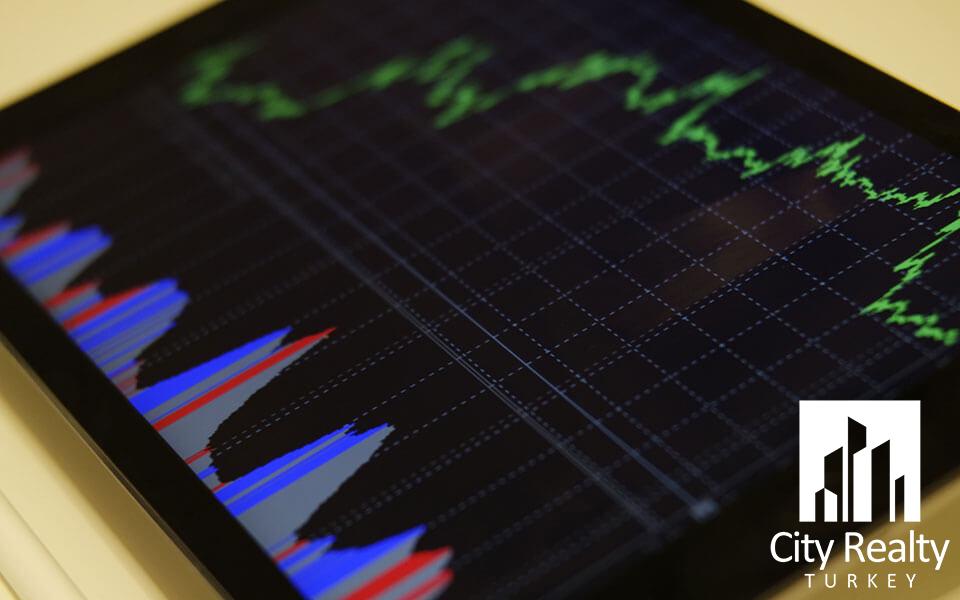When you decide to move abroad for permanent life and buy a property or make other investments, it is vital to know the target country’s economy. Because you don’t just pay for breaks and cement; you also pay for the target country’s currency. In this case, Turkey is not an exception.
Have you ever heard about Turkey’s economic situation?
What do you think about Turkey’s economic situation?
Does Turkey have a prosperous economy?
Does Turkey stand at its prime economy stage?
Do any risks threaten your investment?
What kinds of risk factors may jeopardize your investment?
In this article, the CityRealtyTurkey tries to keep you in the loop of every recent economic event in Turkey honestly and sincerely. The aim is to help you make a ripe investment with confidence. Stick to reading to get exciting information and wide horizons in Turkey’s economy.
A Brief History of Turkey’s Economy
Turkey had conspicuous economic growth in 2021, the highest economic rate among G20 countries after COVID-19-related incurs.
Since September supported demand policy, Turkey’s interest rate had decreased, leading to macro-financial instabilities combined with destruction from the Russia – Ukraine war, which posed lower than 1.4% growth in 2022.
Following low-interest rates since September 2022, food and fuel prices had spiked, affected strictly poor citizens, and postponed gradual employment-driven and post-pandemic poverty recovery programs.
Turkey’s most prosperous economic years have gone back between 2002 and 2017. During this time, Turkey had been on the higher-income countries list. But this situation changed after following the credit boom and demand stimulus policy, which impressively exacerbated internal and external vulnerability.
High private sector debt and persistent current currency deficit were financed through a short-term portfolio. Deploying a short-term portfolio combined with a high inflation rate and the high unemployment rate has deteriorated macro-financial instability since August 2018.
Moreover, because of global and regional decarbonization policies, Turkey has become vulnerable in terms of global energy supply, fuel price volatility, and versatility. Turkey also has a challenge in exporting due to international and regional decarbonization policies.

Turkey’s Economy Volatility Between 2018 -2020
During 2018-2020, Turkey faced an ongoing financial and economic crisis. These years are distinguished by rising inflation, rising borrowing costs, and enhanced loan default.
The main responsible factor that causes crises is excessive current account default and abundant private foreign currency debt. Moreover, Turkish government policy on authoritarianism and rate of interest leads to more deterioration.
Other factors, such as America’s sanctions against Turkey, were dominant factors that impressed the Turkey economy during this period. America deployed sanctions against Turkey after Andrew Bruson was arrested and accused of espionage.
Although crises are the main factor in current currency depreciation in the first stage, the next stage was characterized by corporate debt default and contraction of economic growth. The inflation rate was high, stuck in double-digit numbers, and produced stagnation.
Following extreme stagnation, overheating economic growth ended that posed Turkey with a boom in importing fuel, easy and cheap credit, and government spending finance.
According to evidence, Turkey’s current currency deficit had been increasing from 33.1 billion in 2016 to 47.3 billion in 2017, and in 2018 Turkey’s current currency deficit had reached the top Zenit, around 51.6 billion; which was one of the highest current currency deficits that happened in Turkey’s history.
That is not an exaggeration if the analysts classify this amount of currency deficit on top of the list of current currency deficits happening in the world.
The crisis in the second half of 2018 was the reason for weak economic growth in 2019.
The game began to change in early 2020. Coincidentally with the COVID-19 recovery in 2020, remarkable economic growth started, and Turkey was nominated as one of the rare countries that indicated positive economic growth in the world, approximately 1.8 percent. This successful growth is partly because of government policy to push a sizable credit.
In 2021 Turkey can reach the top growth among G20 countries, but deterioration is caused due to monetary stimulus. Macro financial condition and lira depreciation continued, leading to rapid inflation.
Following Russia’s invasion of Ukraine in 2022, Turkey was far short of mark growth. Noted that the government could control the inflation through taxes reduction and fuel subsidies program.
Up to here, the writer tries to give a complete record of chronological economic events and the reasons; now, the aim is to clarify the inflation situation in Turkey.
How Bad Is Inflation in Turkey?
Suppose you have a plan to move to Turkey for permanent life or want to study at Turkey’s universities. In that case, you need to know about the rate of inflation, especially inflation of commonly bought items as they are needed in routine life, such as grocery items, transportation fees, rent expenses, and electricity bills.
According to citizens’ experiences and documented evidence, some items did not go up as much as others because their production rate went up too. But the daily-needed items went up significantly.
According to the World Bank some popular items for instant vegetables, including potato, onion, eggplant, green beans, and others, have soured more than 50%.
Food isn’t the only item that bites the consumer’s budget; according to accurate records, regular services and routine purchases have been raised and included more proportion of the consumer price index(CPI) compared to the same time of the previous year.
This price atleration is the sharpest price spick in the previous 20 years. Although there is an intention to ignore the rate of inflation in Turkey, the severity of present inflation is tangible among sellers and customers.
It is worthwhile to declare that the Turkish government deploys a supporting program in which some markets record the prices and provide discounted items. Low-income households can record their spending to the government and get wages or pensions. But other people have to deal with current inflation.
According to MetroPoll investigations, 90% of people in Turkey consider the annual inflation rate to be at least 50%, and 60% assume that the annual inflation rate is 100% or even higher.
Non-government assessment inflation by the inflation research group (ENA) and academic survey group that has checked out price hikes since 2020 every month within hours and published its consumer price index. According to their survey, the inflation rate in December 2020 was 82.81%, double the official rate.
The Lira Crush and Inflation
Last year, when the world was grappling with price rises due to a shortage of raw materials, inflation in Turkey was a hard challenge because of the constant depreciation of the lira opposite to the dollar. Since last year, Lira has lost 40% of its value against the American dollar. Lira depreciation has been triggered by the interest decreasing policy, which the government deployed.
Government Policy Runs Counter Lira Depreciation
The government deployed a program to shield lira deposit holders against the decreasing lira value through which if the lira depreciation rate exceeds bank interest, financial loss will be deposited by the government.
Recently more than 60% of all bank accounts in the country are in foreign currency like dollars or euros. The minimum wage hike is reconciled with the price spike. Electricity bills are increased 125% for higher demand- consumers and 50% for lower demand -consumers. Gas tariffs are shot up 50 % for industrial units and 25% for individual consumers.

How Is Investment In Turkey
Whenever you make any investment overseas, you not only invest in bricks and mortar, but you also invest in the target country’s current currency. The main point to be aware of is that you pay the property price in dollars as an overseas investor.
On the other hand, although a solid property value growth is expected in Turkey, due to lira depreciation against the dollar, foreign investors may not be satisfied as much as they expected.
Note that inflation in Turkey, on the other hand, seems a golden opportunity for overseas investors. The property value in Turkey has skyrocketed notably in 2022 compared to last year.
According to Turkey’s central bank statement, property prices have skipped in Istanbul by 1.6m Turkish lira(110000 dollars) in 2022. It means the property prices in 2022 have indicated a 750000 lira boost in contrast to last year.
How Is Life Condition In Turkey
Life conditions have put pressure on citizens, especially poor households and retailers, since inflation has been happening. The Turkish government runs counter inflation by shielding lira deposit holders against the diminishing lira value. Also, pay more pensions to retailers to support them against inflation.
Foreigners who get a salary from their country could have a convenient lifestyle due to the dollar power against the lira. Moreover, the government supports university students through a protective policy. The main budget consumer in Turkey should be considered before moving to this country is renting.
In conclusion, Turkey is classified in the high-income nations list and modern lifestyle facilities. The country reached the highest economic growth among G20 countries.
Although some events, such as the Russian invasion of Ukraine and the worldwide COVID-19 crises in combination with American sanctions against Turkey’s government, the two-digit inflation have taken place in Turkey, the Turkish government seems capable of deterring these deteriorations through scientific policy.
A better future with satisfying growth in the future is expected. Foreign investors or other nationalities who plan for permanent life in Turkey; can have a high-quality lifestyle if they don’t have to pay for rent. Investors who want to buy a property in Turkey would not regret it if they didn’t expect ambitious interests.
If you consider buying property for sale in Istanbul, check out the site.
